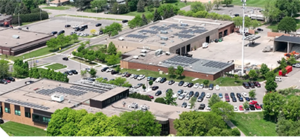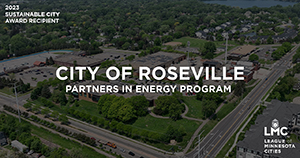Harnessing Roseville Residents’ Zest for Sustainability Pays Off
By Suzy Frisch

When Roseville powered on a solar array on its City Hall roof in 2019 and invested in a community solar garden, it introduced green energy to municipal operations and started reducing its energy costs. At the same time, it ignited a deeper interest in championing more sustainability initiatives across the city.
Residents were already passionate about protecting Roseville’s natural resources, but they got even more fired up about environmental work after seeing solar panels installed on three city buildings.
“The solar work was the kick-off to Roseville putting sustainability topics on the forefront,” says Environmental Manager Ryan Johnson. “Roseville has always been a pretty environmentally focused community. People are looking to make an impact in whatever way they can and share their love for the community to make Roseville a better place.”
Their enthusiasm and advocacy propelled Roseville to engage even more in sustainability, bringing new energy to the city’s efforts, Johnson says. It already had a decade of work under its belt and more projects on the table, including electrifying its vehicle fleet and working on sustainability objectives through Minnesota GreenStep Cities — a voluntary challenge, assistance, and recognition program to help cities achieve their sustainability and quality-of-life goals. Then Roseville was accepted into Xcel Energy’s Partners in Energy program in 2020, and its sustainability work really soared.
Energy action plan partnership
Partners in Energy brings together leaders from Xcel Energy and the nonprofit Center for Energy and Environment (CEE) to help cities develop energy action plans. The two-year program, offered to cities across Minnesota, typically focuses on solidifying strategies for achieving sustainability goals, reducing greenhouse gas emissions, and incorporating carbon-free energy, says Tami Gunderzik, Partners in Energy program manager.
Through the program, Roseville developed a broad platform of ways to engage with residents and businesses about sustainability. It also marshaled resources to further support efforts to reach its environmental goals, like its 2040 Comprehensive Plan to reduce greenhouse gas emissions. For its achievements, Roseville won the League of Minnesota Cities 2023 Sustainable City Award.
The award highlights the work of a GreenStep municipality that made progress on its sustainability goals and accomplished other objectives. Such aims could include significantly involving residents or developing an effective or innovative way to solve a common challenge.
Partners in Energy primed Roseville to create a 14-person team of residents, including a youth representative, city staff, and other local stakeholders. It facilitated workshops that informed how Roseville would approach its more robust sustainability work. Then the team implemented its action plan over an 18-month period.
“Roseville was a great partner for us. They have some genuine commitment there,” Gunderzik says. “There are a lot of competing interests in a city and it’s easy to lose sight of the ball, but Roseville stayed focused and kept things moving forward.”
Areas of focus
The team developed four main goals for Roseville’s energy action plan. It sought to increase residential energy efficiency, especially in older homes, and energy efficiency at small- and medium-sized businesses. The city also would identify high energy-burden households and provide outreach and education about energy assistance and weatherization programs. And it would promote and increase adoption of renewable energy by residents and businesses.
The Partners in Energy process was helpful in steering Roseville to develop a vision and plan for meeting its sustainability goals, Johnson says. It also was critical to have total support for these efforts from city leaders, City Council members, commission members, and staff.
“Partners in Energy solidified our sustainability program in Roseville and lined up what we are going to do during the next five years,” Johnson says. “It helped us focus where our attention was going to go. It’s been a nice springboard for the work, and it’s exciting how fast everything is ramping up.”
Community outreach efforts
The city brought on a Minnesota Green-Corps member and an intern to help, eventually hiring intern Noelle Bakken in 2023 as its sustainability specialist. Her work focused on doing outreach to inform residents about existing sustainability programs, engaging residents and businesses in the work, and expanding efforts when possible.
To that end, Bakken led several initiatives to build deeper connections with residents. That meant creating a bimonthly sustainability newsletter, developing new logos and marketing materials, and increasing community education and outreach via mailings, utility bill inserts, the city newsletter, and social media. The new sustainability newsletter highlights programs, provides tips, and promotes news and upcoming events to keep residents engaged.
With Bakken’s role being new, she needed to determine the most effective ways to connect with residents. She found that being at events and engaging in person was key.
“We had to figure out the best avenues to get out in the community and build connections and trust with the diverse groups in our area,” Bakken says. “Residents were really interested, and we have a lot of residents who are already engaged in the work.”
Between these efforts and numerous community events, Roseville reached nearly all of the city’s 15,000 households and 40,000 followers of its social media channels. The heart of Roseville’s work was publicizing opportunities for residents to take advantage of Home Energy Squad visits.
Provided by Xcel, CenterPoint Energy, and CEE, the Home Energy Squads conduct energy audits of homes and educate residents about how to save on their home energy costs. They often install basic energy-saving measures for free, Gunderzik says. Roseville’s Economic Development Authority provides a 50% discount off the $100 visit and free visits for income-qualified residents. The squads did similar work at small businesses in town, too.
To promote the audits, Roseville contacted 3,000 households and 100 businesses, and staff visited 60 companies. They distributed more than 500 flyers about energy assistance programs to local food shelves and food distribution events, and partnered with community organizations to reach residents from underrepresented groups, including those who are Black, Indigenous, or people of color. Some of that outreach involved translating materials into seven languages. In 2022, Roseville led 26 other cities in the Intercity Home Energy Squad challenge by providing the most Home Energy Squad visits per capita.
In addition, Roseville offers home improvement loans through CEE with low rates to finance exterior or interior energy-efficiency projects. It also encourages residents to participate in community solar and wind energy programs that expand renewable energy.
Awarding good green work
Bakken also focused on revamping the city’s existing environmental awards program. Designed initially to honor residents’ positive sustainability efforts, the Green Award program hadn’t sparked much engagement for seven years. The city renamed it the Roseville Sustainable Steward Award program, expanding its recognition to include local businesses, and started spreading the word.
Roseville got creative by identifying potential nominees through building permit requests. Staff reached out to 49 businesses and residents to encourage them to apply for honors for their work in energy efficiency, water conservation, indoor environmental quality, site and community impact, or renewable energy. In 2022, Roseville received 18 applications, and it recognized two residential properties and one business with awards and cash prizes.
“We were looking for ways to celebrate what residents and businesses were already doing — not just telling them what they need to improve,” Bakken says. “Even if they are small-scale efforts like doing an energy audit or replacing lightbulbs, we want to recognize people for their hard work. There is a lot of doom and gloom in sustainability, and it can be overwhelming. We wanted to focus on small, positive things people can do to move forward in the right direction.”
The work continues
Though its stint in Partners in Energy is over, Roseville’s work to implement its energy action plan will continue. The city will emphasize reducing energy usage, incorporating more renewable energy sources, and targeting even more best practices in sustainability through GreenStep Cities. Next up, Johnson says, Roseville will develop a broader climate action plan, pulling together components like energy efficiency, protecting natural resources, reducing waste, and enhancing the city’s walkability and bikeability.
Roseville’s leadership, residents, businesses, and nonprofits share an enthusiasm for protecting the environment. Now the word is getting out, generating even more participation in sustainability efforts.
“One thing I learned when I first started is that the city was doing a lot of great things with sustainability, but residents didn’t really know what the city was doing,” Bakken says. “In addition to doing outreach about the importance of energy efficiency, we did outreach to say, ‘Here is what the city is doing and here is what we aim to do and what residents can do.’ It’s a nice roadmap to figure out how we can continue this work and even do a little more.”
Suzy Frisch is a freelance writer.


